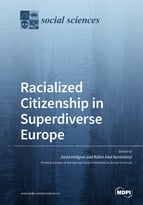Racialized Citizenship in Superdiverse Europe
A special issue of Social Sciences (ISSN 2076-0760).
Deadline for manuscript submissions: closed (31 December 2020) | Viewed by 51640
Special Issue Editors
Interests: My main research areas involve inclusion and exclusion, precarity, and agency of immigrants and racialized groups in European societies, with a particular focus on discrimination viewed as an important obstacle for integration
Special Issue Information
Dear Colleagues,
There is an increasing awareness that experiences of racism and discrimination seriously harm the sense of belonging as well as the opportunities to enjoy social mobility and quality of life for many immigrants and ethnic minority peoples in European societies. Yet, there is also a persistent unwillingness to talk about the racial dimension of the kinds of disadvantage and social exclusion that affect immigrants, their descendants and other racialized groups disproportionally. Race as concept has been viable in Anglo-Saxon scholarship, but much less so in the European context, where it was largely replaced by the broader and less specific term “ethnicity” in the aftermath of the Second World War and the painful unravelling of what barbarism Nazi racialization had led to. But, as Lentin (2008) has argued, the European silence about race has allowed European states to declare themselves officially non-racist, while at the same time continuing to imply an inherent European superiority in which Europeanness presupposes whiteness.
European societies today, and in particular, its metropolis, are often described as superdiverse, applying Vertovec’s (2007) illustrative term to define the ethnic, cultural and religious pluralism resulting from decades of immigration. Simultaneously, Europe appears ever more polarized in its approach to migration and diversity, with growing xenophobic currents in politics and public debates.
This volume enquires into how racialization affects the lives of people affected by it in myriad ways. It provides multilevel perspectives on different forms of exclusion, but also inclusion, of immigrants and racialized minorities in European societies. Taking the racialization of non-white immigrants and ethnic minorities as its vantage point, it identifies two specific purposes:
- To unveil the multiple ways in which racialization operates to hamper the opportunities and sense of identification with society among immigrants and other minorities; and
- To explore some strategies and approaches in order to cope with negative patterns, promoting inclusion and belonging.
The contributors are all scholars who conduct their work at the forefront of contemporary research on race, racialization and the exclusion and inclusion of immigrants and ethnic minorities in European societies. More specifically, their work entails the following main dimensions:
- Theoretical approaches on race, racialization and intersectionality (with specific emphasis on the intersections between race and class, and race and gender, or all three of them) in Europe today; theorizing around key concepts such as race, racialization, citizenship, inclusion and exclusion.
- Empirical studies on discrimination, exclusion, and coping strategies for inclusion and belonging that combine perspectives from disciplines such as sociology, anthropology, human geography and urban studies
- Research based policy evaluation, assessing theoretical and discursive frameworks, implementation processes, outputs and outcomes of policies/programmes of different scope in European societies.
Dr. Zenia Hellgren
Dr. Bálint Ábel Bereményi
Guest Editors
Manuscript Submission Information
Manuscripts should be submitted online at www.mdpi.com by registering and logging in to this website. Once you are registered, click here to go to the submission form. Manuscripts can be submitted until the deadline. All submissions that pass pre-check are peer-reviewed. Accepted papers will be published continuously in the journal (as soon as accepted) and will be listed together on the special issue website. Research articles, review articles as well as short communications are invited. For planned papers, a title and short abstract (about 100 words) can be sent to the Editorial Office for announcement on this website.
Submitted manuscripts should not have been published previously, nor be under consideration for publication elsewhere (except conference proceedings papers). All manuscripts are thoroughly refereed through a double-blind peer-review process. A guide for authors and other relevant information for submission of manuscripts is available on the Instructions for Authors page. Social Sciences is an international peer-reviewed open access monthly journal published by MDPI.
Please visit the Instructions for Authors page before submitting a manuscript. The Article Processing Charge (APC) for publication in this open access journal is 1800 CHF (Swiss Francs). Submitted papers should be well formatted and use good English. Authors may use MDPI's English editing service prior to publication or during author revisions.
Keywords
- racism and discrimination
- social mobility
- quality of life
- immigrants
- racialization
- European societies
- citizenship
- inclusion and exclusion
- theoretical approaches
- policy evaluation






